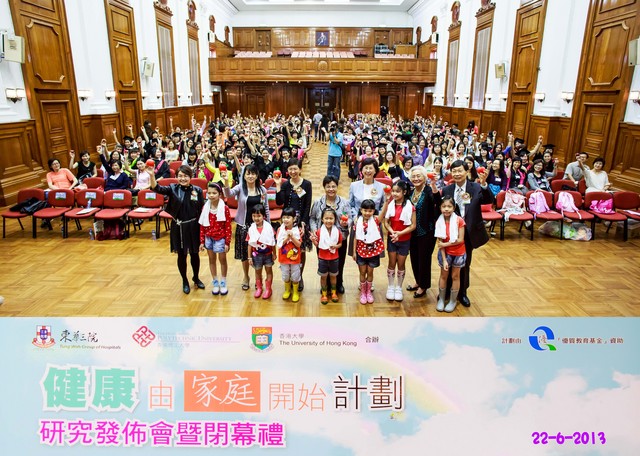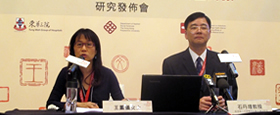
Youth and Family Services
Healthy Start Home Visit Program
According to World Health Organization, “Health is a state of complete physical, social and mental well-being, and not merely the absence of disease or infirmity” (WHO, 1948, p. 100). Therefore, healthy life styles in children should include physical health, cognitive and psychosocial health. As the early years lay important foundation for future years, it is important that programs to promote the health of children should start in the early years. Therefore, Tung Wah Group of Hospitals in collaboration with The Hong Kong Polytechnic University and The University of Hong Kong conduct “Healthy Start Home Visit Program”. To promote the health of preschool children, parent and preschools are important partners so this program focuses on parent education and parent-teacher collaboration. An evidence-based program including child health(nutrition, activities, home safety and oral health), learning(pair reading, preschool concepts) and psychosocial behaviour (child behaviour and parenting skill) are developed by multi professionals. It is funded by Quality Education Fund from June 2010 to July 2013.
The research was conducted by Cynthia Leung, Department of Applied Social Sciences, The Hong Kong Polytechnic University and Sandra Tseng, Department of Social Work and Social Administration, The University of Hong Kong with rigorous research design. It divided by two phases.
Phase I: Pilot evaluation of a home visit parent training program in disadvantaged families
The study reported the pilot evaluation of the Healthy Start Home Visit Program for disadvantaged Chinese parents with preschool children, delivered by trained parent assistants. Home visit was used to make services more accessible to disadvantaged families. The participants included 21 parent-child dyads. Outcome measures included parent report, teacher report and direct assessment of children. Paired samples t test results indicated significant increase in child cognitive measures, child school readiness, child oral health practices; decreases in child sedentary activities, child home injury and hospital visits; decreases in parenting stress and child behavior problems and increases in social support. The parent assistants delivering the program reported significant decreases in child behavior problems and parenting stress from pre-training to post-training and completion of home visits. There was promising evidence that the Healthy Start Home Visit Program was effective in addressing the needs of disadvantaged families with preschool children.
Phase II: The Effectiveness of Healthy Start Home Visit Program, Cluster Randomized Controlled Trial
The study reported the effectiveness of a home visit program for disadvantaged Chinese parents with preschool children, using cluster randomized controlled trial design. Participants included 191 parents and their children from 24 preschools, with 84 dyads (12 preschools) in the intervention group and 107 dyads (12 preschools) in the control group. Outcome measures included parent report and direct assessment of children. Linear mixed-method regression results indicated significant increase in child preschool concepts, decrease in parent-reported parenting stress and child behavior problems, and improvement in parent-reported social support, self-efficacy, child oral health practices, and healthy feeding practices. The parent assistants delivering the home visit programs reported decrease in child behavior problems and parenting stress, and increase in self-efficacy and social support from pretraining to posttraining and completion of home visits. The results provided encouraging evidence that the home visit program was effective with Chinese families.
Our project closing ceremony and research release were grandly held on 22 June 2013 in Loke Yew Hall University of Hong Kong. It is our honor to have Ms. LEUNG Kwai-ling from SWD, Prof. Cynthia Leung from HKPU, Dr. Sandra Tsang from HKU, Dr. Chan Ching Hui from QEF and Ms Patricia Chu form CIFA as our officiating guests.
The project has gained increasing international attention as both pilot and effectiveness study findings have already been published in the international refereed journal Research on Social Work Practice. Besides, the project won the bronze prize award of the “2012 Asian Award for Advancing Family Well-being (3A Project 2012)” organized by Consortium of Institutes on Family in the Asian Region(CIFA).

The research was conducted by Cynthia Leung, Department of Applied Social Sciences, The Hong Kong Polytechnic University and Sandra Tseng, Department of Social Work and Social Administration, The University of Hong Kong with rigorous research design. It divided by two phases.
Phase I: Pilot evaluation of a home visit parent training program in disadvantaged families
The study reported the pilot evaluation of the Healthy Start Home Visit Program for disadvantaged Chinese parents with preschool children, delivered by trained parent assistants. Home visit was used to make services more accessible to disadvantaged families. The participants included 21 parent-child dyads. Outcome measures included parent report, teacher report and direct assessment of children. Paired samples t test results indicated significant increase in child cognitive measures, child school readiness, child oral health practices; decreases in child sedentary activities, child home injury and hospital visits; decreases in parenting stress and child behavior problems and increases in social support. The parent assistants delivering the program reported significant decreases in child behavior problems and parenting stress from pre-training to post-training and completion of home visits. There was promising evidence that the Healthy Start Home Visit Program was effective in addressing the needs of disadvantaged families with preschool children.
Phase II: The Effectiveness of Healthy Start Home Visit Program, Cluster Randomized Controlled Trial
The study reported the effectiveness of a home visit program for disadvantaged Chinese parents with preschool children, using cluster randomized controlled trial design. Participants included 191 parents and their children from 24 preschools, with 84 dyads (12 preschools) in the intervention group and 107 dyads (12 preschools) in the control group. Outcome measures included parent report and direct assessment of children. Linear mixed-method regression results indicated significant increase in child preschool concepts, decrease in parent-reported parenting stress and child behavior problems, and improvement in parent-reported social support, self-efficacy, child oral health practices, and healthy feeding practices. The parent assistants delivering the home visit programs reported decrease in child behavior problems and parenting stress, and increase in self-efficacy and social support from pretraining to posttraining and completion of home visits. The results provided encouraging evidence that the home visit program was effective with Chinese families.
Our project closing ceremony and research release were grandly held on 22 June 2013 in Loke Yew Hall University of Hong Kong. It is our honor to have Ms. LEUNG Kwai-ling from SWD, Prof. Cynthia Leung from HKPU, Dr. Sandra Tsang from HKU, Dr. Chan Ching Hui from QEF and Ms Patricia Chu form CIFA as our officiating guests.
The project has gained increasing international attention as both pilot and effectiveness study findings have already been published in the international refereed journal Research on Social Work Practice. Besides, the project won the bronze prize award of the “2012 Asian Award for Advancing Family Well-being (3A Project 2012)” organized by Consortium of Institutes on Family in the Asian Region(CIFA).








